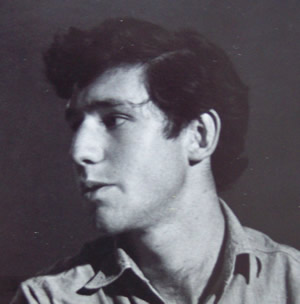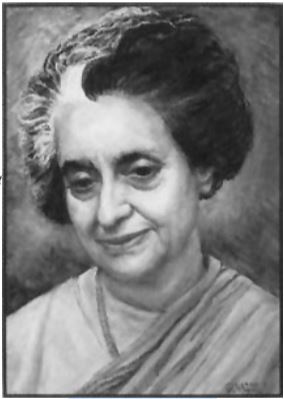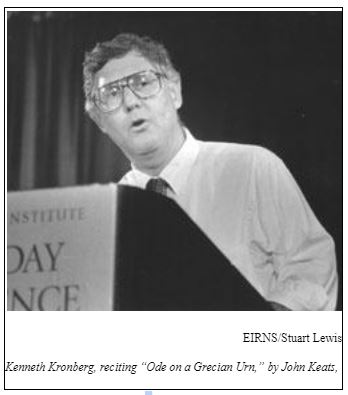April 18, 1948 – April 11, 2007

Ken from his college days.
An extended biography of ken is on wikipedia.org at
http://en.wikipedia.org/wiki/Kenneth_Kronberg
www.kennethkronberg.com was set up shortly after Kenneth Kronberg committed suicide on April 11, 2007, to remember and honor Ken and to make available a link list of websites on which his death and the reasons for it are discussed.
On the 17th Anniversary of His Death
It is 17 years since Ken Kronberg died.
What I have decided to do here, to commemorate the 17 th anniversary of Ken’s death, is a little
different from what I usually do. Rather than reprint the poetry Ken loved and
taught—Shakespeare, Milton, Keats, Shelley—I have decided to reprint one of Ken’s own
poems below, his appreciation of Indira Gandhi. I also reprint the homily given at
Ken’s funeral by the Rev. John Ohmer, then rector of St. James Episcopal Church in Leesburg,
VA.
In Memoriam
Indira Gandhi
d. Oct. 31, 1984
by
Kenneth Kronberg
| COMPOSITION OF this poem, commemorating the October 1984 assassination of Indian Prime Minister Indira Gandhi, began after the mid-flight explosion of the U.S. Space Shuttle Challenger on Jan. 28, 1986. It was presented in India to Rajiv Gandhi, Mrs. Gandhi’s son and then Prime Minister, who in turn had it published in the April 1987 issue of Congress Varnika, the official journal of India’s then-ruling Congress (I) Party. |  Indira Gandhi, oil portrait by Gary Genazzio, 1987 |
I
Ascending now the steep steps at Jaipur,
The watchman paused, held up his lamp;
Below, the moonlight shimmered like a gauze
Of purple muslin, and the wind was damp.
A little further, at the arch above,
A solitary figure plies his trade:
With sextant, glass, and astrolabe,
He plots the stars’ emerge from evening shade.
“What see you, father?” cries the guardsman out
(As torchlight wheels, and ashes fall);
“What future profit do the stars reveal?
Will Fate betray us, all our hopes recall?”
And, turning from his hoops of beaten brass
As if to wake, the sire replies:
“Dear son, my measures cannot scan our fate,
For God’s not dicing with the patterned skies—
“The circles of the stars are moved by One
Who Law upholds, not moments hire ...”
“But surely, father, some small sign He shows,
Some silent message echoes our desire?”
The watchman placed his torch upon the fire,
Awaiting answer to his quest;
the elder put his instruments to rest,
And challenged, said, “My son, what men call
blessed
“Are not the birdsongs’ momentary joys;
Such things soon fade, as lotus hues;
These lustrous forest minstrels were but made
To image the unfolding of God’s muse.”
Unchecked, the guardsman did his cause pursue.
The night was still; an owl swooped past;
No soul disturbed their discourse thus, until
The dawn spread open to the world at last.
II
Above all else, what endeared her to us
Was her toughness of intellect, the star
She word diamondlike in the Indian sky.
She was descendant of a nation-building
Family, and sought to lift her people
Upon the pinnacle of history.
Now she is gone, this jewel whose enemies
Called tyrant. Harsh winter whistles though the trees.
They, they will inherit this barrenness.
III
The “Discovery of India,” she knew,
Was India’s discovery anew
That ancient pathways strengthen our resolve
To generate the future, to evolve—
That knowledge of the past will guide our way,
As God’s untested spacecraft we embark,
To lift us beyond height, whence we survey
The mobs of ignorance, suspicions dark—
That misery and tumult, pain and want
Are not man’s state of nature, but a cave,
Whose depths may be illumined by a spark
Brought down from heaven, to emblaze our hearts.
Beside man’s hearth there burns a sacred fire,
Nurtured by huntsmen ’gainst the starlit night;
O, let the orchids that adorned her pyre
Become the blossoms of that holy light!
For the India she saw, was never known
Except as past and future, never shown
Except to those whose vision could contain
The lofty Himalayan mountain range.
Her ashes blow, they billow in the wind;
Like birds they twist, they soar beyond our sight;
Remember us, Indira, on your flight;
Bear witness to things greater than our sins.
How rare those moments, when our eyes reveal
A beauty born of certitude and warmth;
How short those glimpses, which above we steal,
To recognize God’s triumph over death!
Let the star’s celestial motions
Unwind flowerings of grief;
Let her fathers’ secret ages
Mourn nobility too brief.
IV
“From fairest creatures we desire increase”;
From all God’s creatures we desire increase;
From each and every flower and leaf
Our hearts burst open for the soul’s release.
Our Bard, who fashioned music from the rude,
Unfinished letterings of earthy men,
Bequeathed to us a father’s attitude
Toward those who seek their nurture from our pen;
For wisely sang he praise of nature free,
Of love and beauty, twilight, of the Age—
What star amongst us dare to sing as he,
Unstrained, the precious goodness man attains?
__Indira. like Shakuntala, fly o’er:
__Lead continents of children to explore!
Kenneth Kronberg
October 25, 1986
Jaipur Greatest of the 18th-Century astronomical observatories build by the scientist-statesman Jai Singh.
“The Discovery of India” Jawaharlal Nehru, Mrs. Gandhi’s father, wrote this history of India while imprisoned by the British during the 1940s.
“From fairest creatures we desire increase” From the opening of Shakespeare’s sonnet series, the great fugue which charted the laws of verbal action in the English language.
Shakuntala Heroine of the drama by Kalidasa, the Fourth-Century author considered to be the greatest poet and dramatist of Sanskrit literature.
The Cave Book VII of Plato’s Republic. Is it the Greek Prometheus, or the Vedic Agni, who ignites man’s creative spirit?
Homily preached at the Funeral of Kenneth Kronberg
The Rev. John Ohmer
Rector St. James’ Episcopal Church
April 19, 2007
When Molly, Max and I sat down to plan this service, I asked what their wishes for the service
were – what they hoped the service would mean for them and for those gathered here. Now most
of the time, when I ask that question to a grieving spouse and children, I get something of a
blank stare, a shrug of the shoulders – (as if to say) I don’t know.
Not with Molly and Max. Without hesitating, really, they answered: okay, #1) – we want this
service to reflect Ken, not us. #2) (here I started taking notes) Ken was Jewish, his family’s
Jewish: even though the service will be held in a church, we want to be mindful of that,
respectful of that. #3) besides, practically speaking, all this is kind of moot, because several years
ago, during one of those long car rides where the conversation goes everywhere, Ken told Max
what he wanted at his funeral: he spelled it out. (Apparently Ken believed that one’s funeral is
not something one leaves to the vagaries of local clergy and grieving families. So he spelled it
out.) And so it is, that we have a funeral service that is all the things Ken was. Or let me at least
suggest five traits, or characteristics, of Ken’s as found in this service. Number one, Ken was
extraordinary. And I mean just that: extra-ordinary, outside the ordinary. I don’t know anyone
else who would say, in a long car drive with their son, “you know, at my funeral it’d be nice to
have Beethoven’s Variations for Cello and Piano on ‘See the Conqu’ring Hero Comes’ from
Handel’s Judas Maccabaeus… And it should be followed by that poem from the Statue of
Liberty, don’t you think? Extraordinary! And in that Emma Lazarus poem is a clue to a second
characteristic of Ken: he could be brusque and gruff – “not like the brazen giant of Greek fame”
– we don’t want big old Colossus conqueror!, here on our shores we want a woman with a torch,
saying, “keep, ancient lands, your storied pomp!” keep your hoity-toity rich people, we don’t
want ’em…give us your tired, your poor, your huddled masses, that’s who we want. –
(And here, on the inside front cover of our leaflet, in place of the usual gregarious welcome
letter, we have Psalm 3, and not just any Psalm 3, but John Milton’s paraphrase, so the first
words we’re greeted with this afternoon are “Lord, how many are my foes, How many those
That in arms against me rise… …[R]ise Lord, save me my God, for thou Hast smote ere now On
the cheek-bone all my foes. Of men abhor’d Hast broke the teeth.” A little different from our
normal, “Good afternoon and welcome to St. James! We’re so glad you’re here!”)
Brusque, and gruff, and yet…a third characteristic of Ken: at the same time he could be so
patient, and such a patient student, such a patient editor, midwife-ing a good idea. And a patient
teacher: by his request, we’re going to hear Max read us Shelley’s Ode to the West Wind… and
no, not just the first and last stanzas, but all 70 lines. In his life, and now even in his death, Ken
is casting a vote of confidence in his students, confident in Max’s ability to read poetry, and in
our ability to hear it. Which brings me to the fourth characteristic of Ken. He was a poet. (He’s
way too introverted to allow any of his own poetry to be read today), but he saw the world
through a poet’s eyes, experienced life through with a poet’s heart. And so no funeral leaflet of
his would be complete without a Shakespeare Sonnet on the back cover.. …a sonnet about love’s
fire. The fire of love that heats water And water cannot cool… …a sonnet ending with “water
cools not love.” And therefore -- it’s no coincidence -- that Ken’s funeral leaflet ends with that
line… …what is the last word Ken leaves us with? Love.
And that brings me to my assigned passage, and Ken’s fifth and final, and most important
characteristic: love, and Paul’s remarkable hymn to love, first Corinthians 13. It’s a well-known
passage, a passage you often hear read at weddings. And it’s a remarkable passage, all the more
remarkable when we remember the context in which it was written. Paul wrote the letter to the
Christians living in Corinth around the year AD 54 – over 1,950 years ago. Corinth was, at that
time, one of, if not the, largest and most important towns in Greece. Very important Seaport
Garrison town. Strategic road-juncture. Capital of the Roman province. Filled with a
cosmopolitan crowd. “Corinth” back then was a synonym for power, decadence, opulence…in
other words, imagine taking all the power struggles of Washington, DC, and the wealth of
Manhattan; all the opulence of Hollywood, all the decadence of Las Vegas; and combining
them—and you’ve got a pretty good idea of Corinth.
So Paul writes to these people; it is a wake-up call, a call to self-examination and repentance. So
much of the other chapters of 1st Corinthians are filled with explicit and stern instruction and
direction … Paul criticizes their sexual immorality, their arrogance, their litigiousness and
complacency, their irreverence and pride and lifestyle. He’s very direct! But then he says this:
You know, if I say all these things in the most convincing way possible – “though I speak with
the tongues of men and of angels,” – if I am the most eloquent person in the world, but have not
charity, have not agapē, don’t do it with love, it’s not eloquent. Eloquence delivered without
love makes the same sound as a sounding brass, or tinkling, clanging cymbal – …the sound of
fingernails on a blackboard, Eloquence without love is nothing but obnoxious noise.
(He goes on to say) If have the gift of prophecy, and understand all mysteries, and have all
knowledge – If I have the wisdom of Solomon, the intellect of Einstein, if I have nine PhDs and
have published fifteen books – but don’t have love, I am nothing. It doesn’t matter. If I have all
faith so as to move mountains – if I have all the faith of Mother Teresa, and give away all I have
in solidarity with the poor, if I hand over my body and become a martyr, but have not charity, it
profiteth me nothing: it doesn’t help. The love of which Paul speaks is slow to lose patience, and
is kind. It does not envy. It vaunteth not itself, is not puffed up, seeketh not her own. Love does
not violate individuality, is not easily provoked, looks for ways of being constructive, is not
irritable, or touchy, it beareth all things, believeth all things, hopeth all things, endureth all
things; it never faileth. Some time ago, Ken told Molly and Max something very significant, that
shed light not only on his life, but on his death, and the manner of his death: he said, I used to
believe that conflict – attacking everyone all the time – was the way of the universe. I now know
that the universe is run by love. When the values you are surrounded by are in conflict with the
principles you believe in, it causes pain. For most of us, that pain is tolerable: For Ken, it must
have become intolerable…too much. Ken, like the rest of us, saw through a glass darkly. He
knew so much: he was such an extraordinary person; he was, even in his gruffness, patient. He
was “glad to learn and glad to teach.” He was a poet, and until the very end… he had faith, and
he had hope, and he had love. But the greatest of these is love. A love that was poured into his
heart, generously given to others, and passed on to Molly and Max. Water cools not love. Death
cools not love. Nothing cools love: The last word is love.

